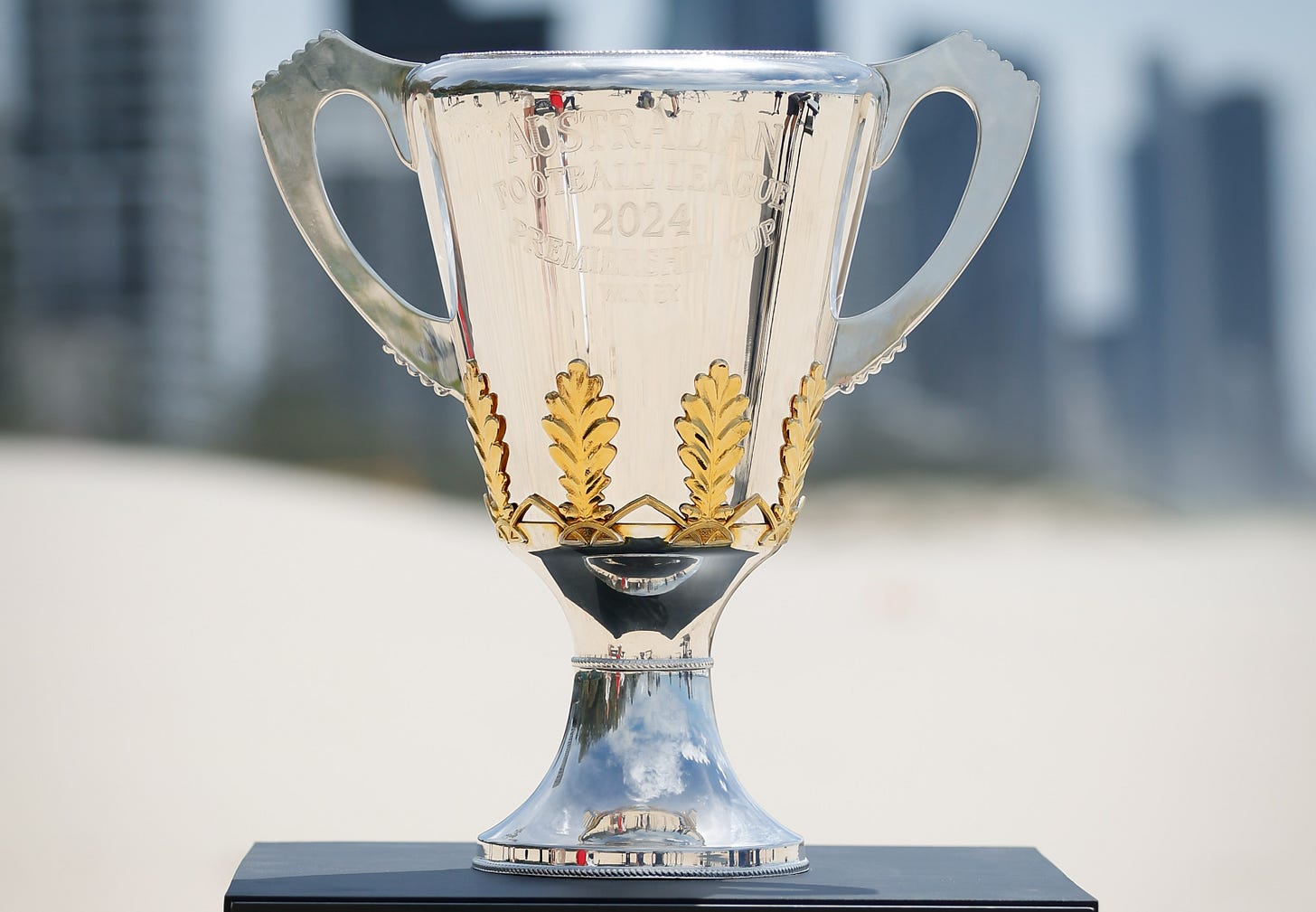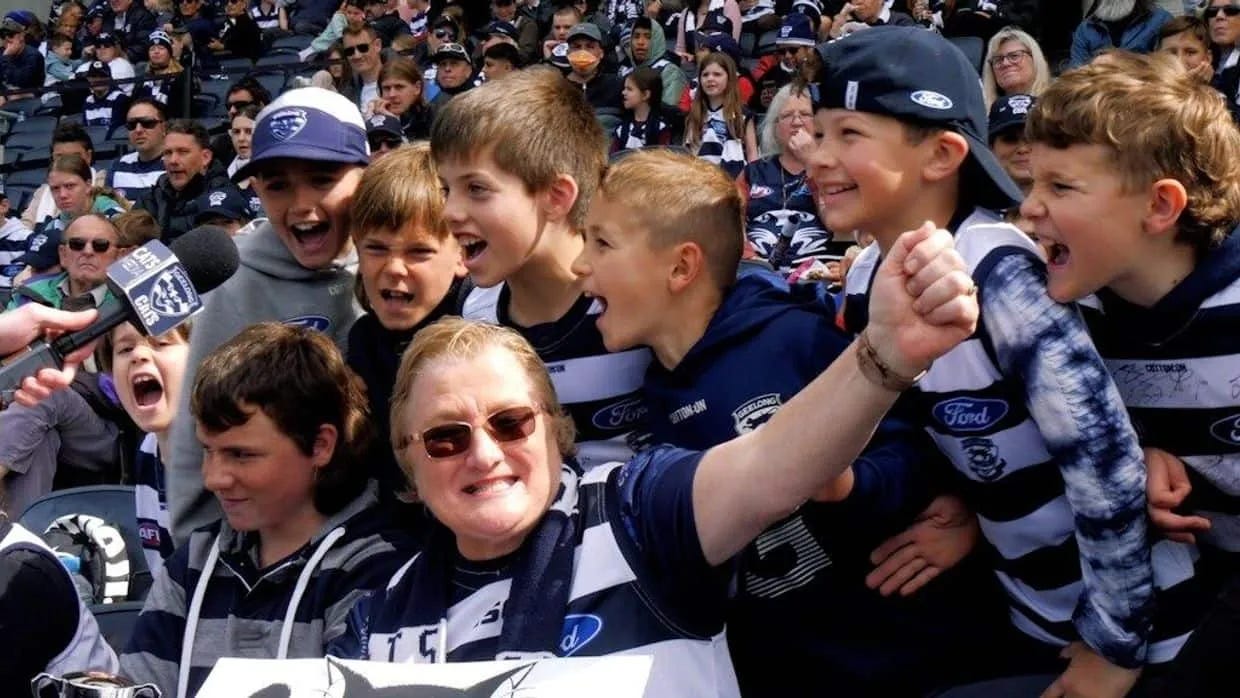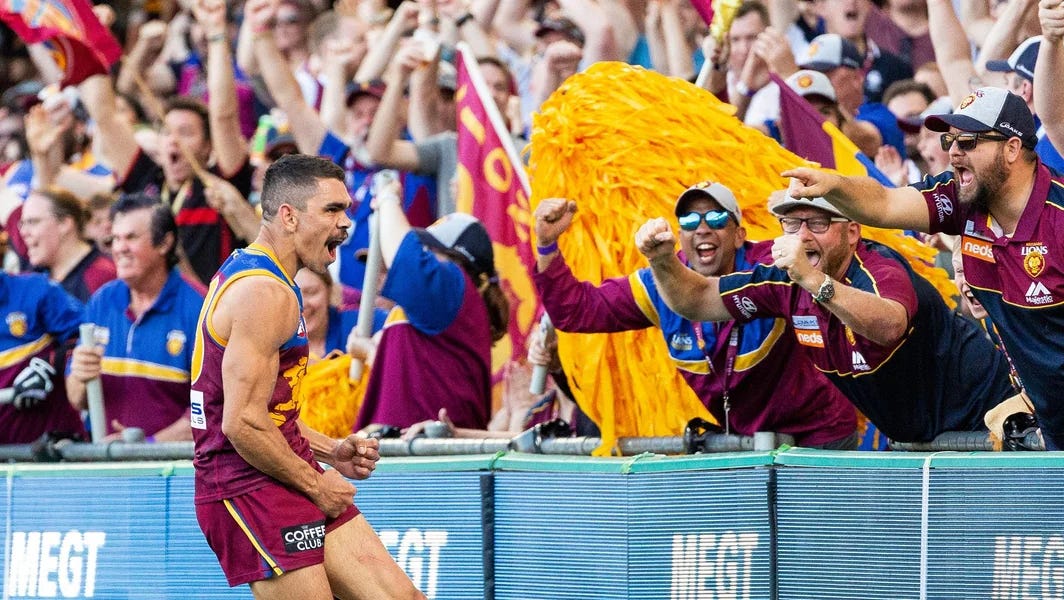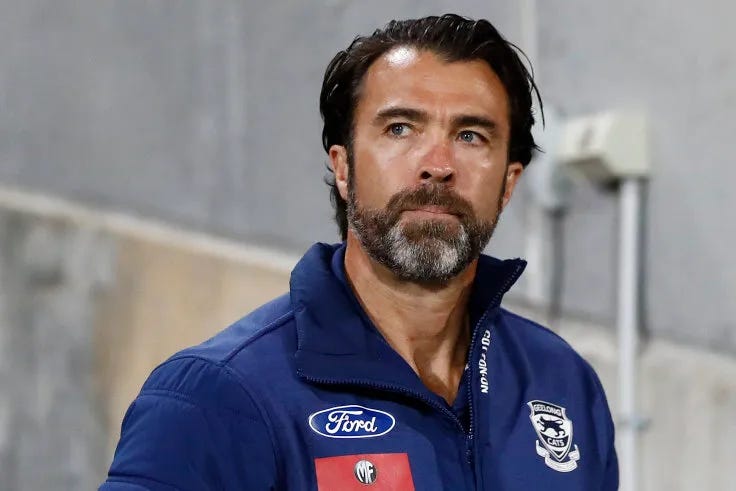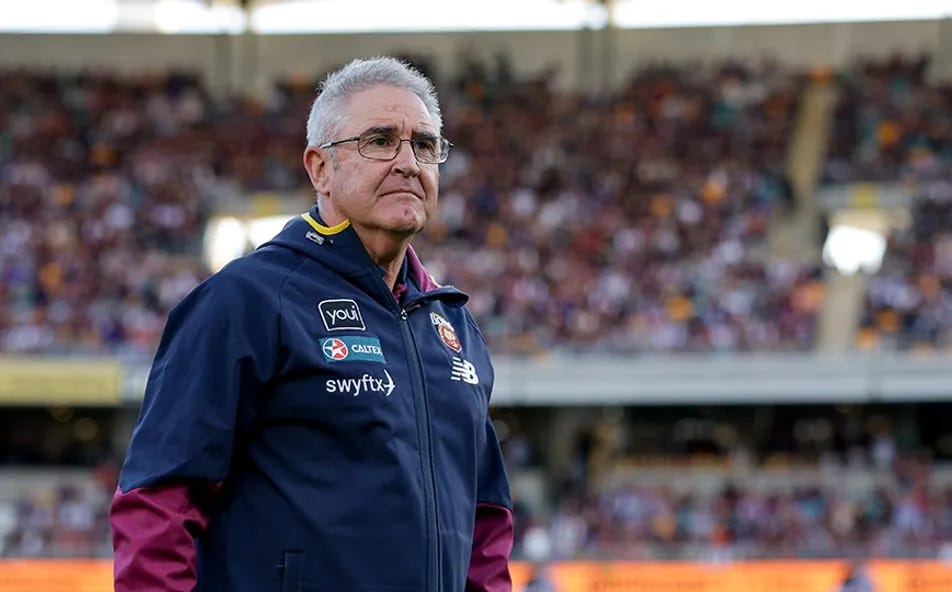Who to barrack for…Geelong or Brisbane?
Or, Chris Scott and 'Father' Chris Fagan? Now, that's a tough decision.
Just setting the tone here. I realise that many of our U.K. readers might have only a minor association with Australian Rules Football—or none at all. And cricket chatter is what pays the bills here—or not! However, here, the AFL Grand Final is a serious affair, comparable to the FA Cups of old. Geelong (Cats)—a legacy club—will start as favourites. Brisbane (Lions)—a relatively new franchise—returns to the MCG as defending premiers after defeating Sydney by 60 points in 2024. More importantly, the two clubs are blessed to have two outstanding coaches. Chris Scott leads the Cats, and ‘Father’ Chris Fagan is in charge of the Lions. I have the utmost respect for both and have written about them previously. More on that later. Please stay with us.
It’s easily my favourite Aussie sport’s word, barrack, and barracking. I’ll save you the explanation.
OK, in short, “Barrack” could refer to military housing; in these parts, it’s a verb, meaning to support or cheer for a sports team. In Melbourne—a generalisation—but pretty much everyone ‘barrack’s for someone. I barrack for Richmond (Tigers).
With Richmond languishing low on the ladder, the question is: if you barrack for a team in Melbourne, or further afield, but live in Geelong, should you be barracking for the Cats in Saturday’s Grand Final? I’m saying yes, even if the crew from Kardinia Park can be a tad polarising—really, I’m not sure why. They win and continue trying to win, unlike many clubs in the AFL competition. If permitted, I would consider jumping ship, but it’s just not done. That said, my daughter switched teams—Bombers to the Tigers!
SpeakingCricket is made possible by your subscriptions. If you’re still a free subscriber, please consider upgrading to a paid subscription. Your support truly makes a difference.
The same could be said for the many Victorians who have fled the Mexican state for Queensland, seeking warmer winters and cheaper flip-flops. Should they be barracking for the Brisbane Lions if they’re not a Catter? Again, I say yes. I was going to mention the Collingwood fans, but that would be too challenging. They would barrack for neither, and probably refuse to watch the game—they lost to Brisbane in last week’s semi-final.
For many Australian families, Grand Final Day transcends sport—it becomes an annual pilgrimage, steeped in traditions passed down through generations. Early starts are the norm, and local bakeries are kept busy. Backyards are prepared in advance, BBQs dusted down, and eskies stocked with ice and refreshments. And then there is the Pub—this will be my choice of venue. Norm Smith Medal (MVP) sweeps are run, as well as first goal scorer and a variety of other side bets. The Elephant & Castle—my Pub of choice in Geelong—will do a great job.
It’s a day for geographical loyalties to blur, when expat Victorians dust off their old guernseys (shirts), and when even the most casual observers find themselves emotionally invested in the game, deliberating whether the Cats can claim another flag or if the Lions can go back-to-back. The beauty lies not just in the spectacle, but in the shared moments that bind people together, one tradition at a time.
The Rules Aren’t Really the Problem
There’s an uncanny irony in the name “Australian Rules Football” that rarely fails to amuse those who’ve grown up with the game. Foreign friends will invariably ask, “So what are the rules?”—as if expecting some mystical code that unlocks the secrets of this unique sport. The truth is, the rules are surprisingly straightforward: get the ball between the big sticks for six points, the smaller ones for one, and don’t get caught holding it too long without bouncing or handballing (a form of throwing) it away. You can catch it, kick it, punch it, but not throw it. Simple enough? I think so, but to see the game umpired, you might form a contrary opinion.
What confuses most isn’t really the rulebook—it’s the manic chaos that unfolds when 36 athletes are set loose on an oval the size of a small suburb, with play flowing in any direction at breakneck speeds. It’s a rugby code meets Gaelic football meets rollerball, with a dash of ballet thrown in when a player takes a spectacular mark (catch). The real skill lies not in understanding the rules, but in reading the game’s rhythm, anticipating where the next contest will emerge, and appreciating the split-second decisions that separate winners and losers.
So, finally, we circle back to the coaches: Chris Scott and Chris Fagan, the conductors.
Chris Scott won a premiership in his first year coaching Geelong. Chris Fagan won the premiership in 2024 and returns for a shot at the quinella. Chris Scott was a player—a tough, uncompromising individual. Chris Fagan didn’t play in the AFL. He chose the classroom, where I imagine he would have been a considerate teacher.
Back to Scott and 2011. I wrote about it here in 2022.
Yet, when Chris Scott delivered this coaching rarity in his first season at Geelong football club in 2011, there was chastisement, not adulation. It was as if he had stolen the town’s crown jewels. It somehow didn’t belong to him, similar to an unexpected inheritance from a distant aunt, something subconsciously you feel you should give back, but of course, don’t.
And…
Geelong, as a region, can be regarded as a heavy lifter. The city has been, and is, a critical transportation hub — by port, rail and road, servicing the agricultural needs of the Western District. Labour intensive industry prevails. The Ford factory, now closed, has been intrinsically linked to the football club for years — the partnership will reach its centenary in 2025. No doubt it was full of bloody tough, no-nonsense, individuals, who endured lengthy work weeks, and even longer weekends.
Education, in the main, is delivered through elite, esteemed private schools, where some students still board! Parents seem more willing to transpose themselves in Geelong, working their professional jobs remotely, and then the younger single professional tribe seems content with its nightlife and broadband speeds. And, of course, their Melbourne fix is met by taking the ‘rattler’ to town — which no longer rattles. All that has a paradoxical feel to it when you delve into the real underbelly of Geelong.
So, you have these two contradictory classes that co-exist. The old are reluctant to relinquish a custodial hold on what they believe to be theirs. Football, through these eyes, is still very much a weekend pursuit for both them as spectators and what they expect from ‘their’ players. Yes, ‘their’ players — smothering, helicopter-style parenting is in play here. This tribe separates players from coaches with a clear leaning toward the player.
This from September, 2022. And it’s likely Scott’s record has improved.
To date: Chris Scott, the coach, has 199 wins from 285 starts, giving him an 80% win rate. In his 12 seasons as head coach, Geelong has only missed the finals once (2015) — a supporter cannot ask for much more — those are the distilled facts. His win-loss percentage ranks alongside the world’s finest coaches. And, still, I can hear the bigoted tribe banging their drums — ‘his finals record is deplorable in comparison to his regular-season record’. Hello, surely, your players have to take some responsibility here!
And, ‘Father Fagan’
This from September, 2023. You can read the full post here.
Why I like Chris Fagan…
Being a sports fan and living in Melbourne, one is naturally persuaded by the allure of AFL Grand Final week. There’s a ritzy best-and-fairest event, player parades through the city, an event where notables try to kick a footy across the River Yarra, and just about everything else you can imagine.
Football likens itself to taxes and the unmentionable; there is simply no escape. It is truly suffocating during any typical week through the regular season; this week, though, is next level.
Hey, that said, I’d take this week over taxes and that other stuff any day! Wouldn’t you?
Unfortunately, with all this comes the inevitable hype and noise from football’s circling circus.
It’s true, football is no ‘cottage industry; instead, it feeds an army of hangers-on: multi-dimensional media, the coterie industry, social media, families, fans, supporters, and barrackers, all pouring over every utterance, fact or fiction.
But then there is a beacon: somebody, or those that stand out from the crowd.
Chris Fagan stands out as a bastion of distinctiveness in the staid waters of AFL coaching, his unpredictable aura defined by an exceptional fusion of sagacity, unassuming humility, and an unwavering, soul-deep ardour for the game of football.
In stark contrast to the superfluity of coaches who lean heavily into strategic facility, Fagan’s hallmark lies in his engaging talent for forging profound, personal connections with his players. Be sure, these are not superficial relationships. Fagan moulds brotherhoods, tribes, and fraternities.
Born in Queenstown, Tasmania. Fagan played 263 games in the Tasmanian Australian National Football League (TANFL) and Tasmanian Football League (TFL), with Hobart, Sandy Bay, and Devonport kicking 430 goals.
What does all that mean? Not much, really, other than it qualifies one of Fagan’s core principles: longevity.
Fagan’s stripes were not handed to him; on the contrary, he earned them as they should. And he asks the same of his players.
“Chris Fagan galvanises attentive listening through actually believing his every word.”
There’s not one skerrick of BS in Fages. Or Chris Scott. They are both consummate professionals.
I hope you enjoy the game wherever you are. I’m barracking for a tie!



